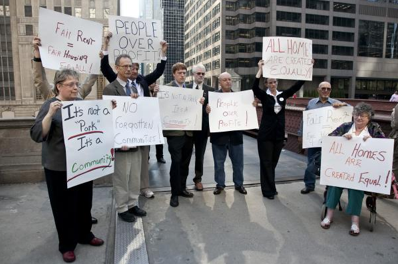Tenants Accuse Residential Community Company Of ‘Unfair Rent Increases’, Abusive Practices
From Progress Illinois
Residents of the nation’s largest corporate owner of manufactured home communities, Equity LifeStyle Properties (ELS), say the company is engaging in abusive practices and general disinvestment in its properties.
Wednesday, a group of more than 20 residents from across the country gathered outside ELS’ annual shareholder meeting in Chicago and demanded to be heard by the company’s founder and chairman, Sam Zell.
 While a few demonstrators attended the meeting, several protesters rallied outside and urged Zell and other ELS executives to stop “unfair rent increases” that push residents, most of them retirees on fixed incomes, out of their homes and into poverty.
While a few demonstrators attended the meeting, several protesters rallied outside and urged Zell and other ELS executives to stop “unfair rent increases” that push residents, most of them retirees on fixed incomes, out of their homes and into poverty.
The demonstration was part of an ongoing battle between ELS and residents who want better living and renting conditions.
“My lot rent is more than half of my Social Security,” said Carla Burr, a 59 year-old resident of an ELS property in Chantilly, Virginia.
Burr pays a monthly lot fee of $945 and makes an annual income of $42,000. But, when she turns 65 she stands to lose an employer disability payment that will cut her income almost in half.
“I don’t know if I’ll be able to stay in my house,” she said, noting her lot fee has increased $30 to $40 every year since she moved in, in 2006. “(ELS’) main goal is to win money for their investors at any cost, and they don’t care who they hurt.”
Traded on the New York Stock Exchange, ELS is a real estate investment trust (REIT) with communities in 32 states and British Columbia. According to the website, the company owns or has ownership interest in 380 properties – two of which are in Illinois – with more than 141,000 sites total.
ELS is putting profits over people, according to Ishbel Dickens, executive director of the Seattle-based National Manufactured Home Owners Association (NMHOA).
NMHOA organized the demonstration with Washington, D.C.-based Campaign for Community Change and brought residents from eight different states to Wednesday’s shareholder meeting at ELS headquarters in Chicago.
“(ELS’) business model is to return a high profit in a short-term and the only way the company, as a REIT, can do that is by increasing rents or not investing in their properties as a way to give shareholders a higher return,” Dickens said.
 Meanwhile, according to TheStreet Wire, ELS has exhibited “solid stock price performance.” During the past fiscal year, ELS increased its bottom line in earnings per share growth to $1.32 from $0.74.
Meanwhile, according to TheStreet Wire, ELS has exhibited “solid stock price performance.” During the past fiscal year, ELS increased its bottom line in earnings per share growth to $1.32 from $0.74.
Protesters also argued ELS uses significant amounts of money to support initiatives and ballot measures that directly impact manufactured homeowners, such as challenging rent controlled ordinances in California.
In April, the 9th Circuit Court of Appeals ruled that a rent control ordinance for mobile homes in San Rafael, California, was not unconstitutional. The ruling was in connection with ELS’ lawsuit challenging the City of San Rafael’s rent control ordinance.
“We’re concerned with how the company is addressing political advocacy,” said Adam Rust, director of research for Reinvestment Partners, which is an ELS shareholder.
Rust said he’s heard stories of ELS’ general disinvestment in properties, including stories about roads not being maintained, sidewalks being cracked, malfunctioning water systems, pools not being cleaned and poorly maintained landscaping.
Meanwhile, he added, the company spent $6.5 million on the lawsuit against San Rafael’s rent control ordinance.
“(Shareholders) are concerned with expenses on political contributions to pursue an advocacy agenda that we don’t think really represents the interests of residents, and which, to some degree, undermines the ability of the company to continue to generate shareholder equity over the long-term,” Rust said.
Rust presented a shareholder resolution that, if passed, would have required ELS to divulge its expenditures, such as monies spent on political advocacy. Rust said he was curious to see where ELS’ priorities lie.
The resolution was ultimately voted down, but Rust said “it was more about being a witness to something.”
A few of the protesters were also able to attend the meeting, during which they were provided a short question and answer session with Brad Nelson, senior vice president of East Operations, and Ron Bunce, senior vice president of West Operations of ELS.
According to Pam Bournival, 56, a resident of an ELS property in Sarasota, Florida, the open dialogue session indicated protesters are “on their radar.”
Bournival has attended shareholder meetings for the past four years, and said Wednesday’s meeting marked the first instance in which residents were allowed open dialogue with executives. She said she was “surprised” by the question and answer session and would have preferred notification about the opportunity ahead of time.
“Things were not overly optimistic, but we’re pleased with some positive steps,” Bournival, who is also secretary of NMHOA, said. “We still want to meet with board decisionmakers.”
Sam Zell was not in attendance and the meeting was closed to the media. An ELS spokesperson could not be reached for comment.
“We’re going to keep on them until they agree to meet with us,” said Burr.
With the rising costs of food and utilities, increasing lot fees are spreading her finances alarmingly thin, Burr added. She said she will most likely have to move when her employer disability payments run out in six years.
“I’m not opposed to ELS making money,” Burr said. “But how they’re doing it is pushing residents out, they’re shooting themselves in the foot.”
Here’s more from Burr:
